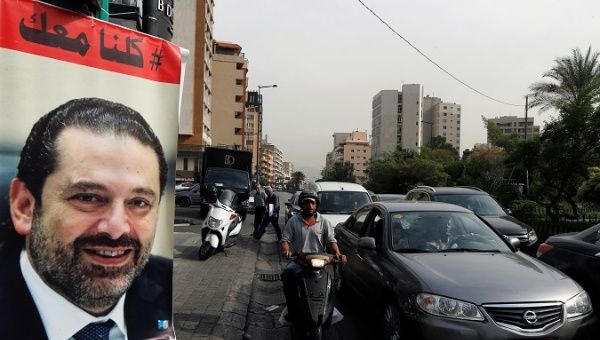
Saad al-Hariri, who sparked a crisis by resigning as Lebanese prime minister on Nov. 4 during a visit to Saudi Arabia, will leave Riyadh for France on Friday, a member of his party said, but will not return directly to Beirut after the visit.
Macron, speaking in Sweden, said Hariri “intends to return to his country in the coming days, weeks”.
Hariri’s abrupt resignation while he was in Saudi Arabia and his continued stay there caused fears over Lebanon’s stability and thrust it into the bitter rivalry between Riyadh and Iran.
Saudi Arabia and its allies are fighting for sway across the region against a bloc led by Iran, which includes the heavily armed Lebanese Shi‘ite Hezbollah group.
In Lebanon, Hariri has long been an ally of Riyadh. His coalition government, formed in a political deal last year to end years of paralysis, includes Hezbollah.
Saudi Arabia and Hariri say his movements are not restricted. On Wednesday, Macron invited Hariri to visit France along with his family, providing what French diplomats said might be a way to reduce tensions surrounding the crisis by demonstrating that Hariri could leave Saudi Arabia.
Lebanese politicians from across the political spectrum have called for Hariri to return to the country, saying it is necessary to resolve the crisis.
Foreign Minister Gebran Bassil, who heads President Aoun’s political party, said on Thursday Beirut could escalate the crisis if Hariri did not return home.
“We have adopted self-restraint so far to arrive at this result so that we don’t head toward diplomatic escalation and the other measures available to us,” he said during a European tour aimed at building pressure for a solution to the crisis.
REGIONAL CRISIS
Saudi Arabia regards Hezbollah as a conduit for Iranian interference across the Middle East, particularly in Syria, Yemen and Bahrain. It says it has no problem with Hezbollah remaining a purely political party, but has demanded it surrender its arms, which the group says are needed to defend Lebanon.
Although Riyadh has said it accepted Hariri’s decision to join a coalition with Hezbollah last year, after Hariri announced his resignation Saudi Arabia accused Lebanon of declaring war on it because of Hezbollah’s regional role.
Lebanon, where Sunni, Shi‘ite, Christian and Druze groups fought a 1975-1990 civil war, maintains a governing system intended to balance sectarian groups. The prime minister is traditionally from the Sunni community, of which Hariri is the most influential leader.
On Friday, Hariri said in a tweet that his presence in Saudi Arabia was for “consultations on the future of the situation in Lebanon and its relations with the surrounding Arab region”.
Maha Yahya, director of the Carnegie Middle East Centre in Beirut, says it appears Saudi Arabia hopes the ministers will adopt a “strongly worded statement” against Iran.
But she said not all the countries share Riyadh’s view that one way to confront Iran is to apply pressure on Lebanon.
“There is quite a widespread understanding that there is only so much Lebanon can do and it doesn’t serve anybody to turn Lebanon into your next arena for a fight between Iran and Saudi Arabia,” said.
REUTERS

Leave a Reply
You must be logged in to post a comment.